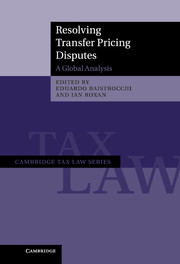Book contents
- Frontmatter
- Contents
- List of figures
- List of tables
- List of contributors
- Acknowledgements
- The Golden Bridge: analytical table of cases by topics in the OECD Guidelines
- Table of Cases
- Abbreviations
- Part I The context of transfer pricing disputes
- 1 Introduction
- 2 The transfer pricing problem
- Part II North America and Europe
- Part III Asia Pacific
- Part IV BRIC Countries
- Part V South America, Middle East and Africa
- Part VI Conclusion
- Index
- References
1 - Introduction
from Part I - The context of transfer pricing disputes
Published online by Cambridge University Press: 05 November 2014
- Frontmatter
- Contents
- List of figures
- List of tables
- List of contributors
- Acknowledgements
- The Golden Bridge: analytical table of cases by topics in the OECD Guidelines
- Table of Cases
- Abbreviations
- Part I The context of transfer pricing disputes
- 1 Introduction
- 2 The transfer pricing problem
- Part II North America and Europe
- Part III Asia Pacific
- Part IV BRIC Countries
- Part V South America, Middle East and Africa
- Part VI Conclusion
- Index
- References
Summary
A transfer pricing dispute
Pharmaceutical companies need to have a continuing supply of good research developments to maintain their future profits. Their ability to profit from this research depends on exploiting patents based on the results of the research, but patents expire after a number of years, allowing other companies to compete with the developer, and some drugs are simply superseded by later developments.
In the 1960s, one major US pharmaceutical company had developed a number of valuable patents. The company naturally wanted to limit the amount of tax it would have to pay to exploit these patents. So in 1965 it established a subsidiary in Puerto Rico (a United States' dependency). At the time, US tax law permitted the transfer of patents to a Puerto Rican subsidiary tax free, and Puerto Rico offered tax haven treatment on the returns from exploiting the patents. The US parent therefore transferred the patents to the subsidiary without receiving any payment or royalties in return. The subsidiary relied on the patents in manufacturing the drugs they covered, and sold the products to the US parent.
- Type
- Chapter
- Information
- Resolving Transfer Pricing DisputesA Global Analysis, pp. 3 - 9Publisher: Cambridge University PressPrint publication year: 2012

